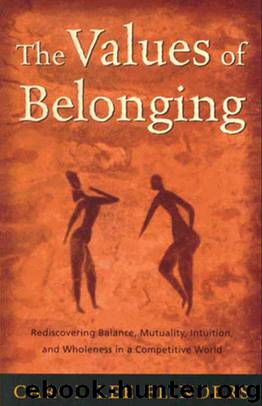The Values of Belonging by Carol L. Flinders

Author:Carol L. Flinders
Language: eng
Format: epub
Published: 2019-01-31T16:00:00+00:00
O UR W HOLE L IVES
Like most women my age, I grew up believing that life is essentially about men—that history is the history men make, poetry and painting are the creation of men, and so on. Not really seeing women, not always hearing them, and worse still, not questioning their absence—from film festivals or literary reviews, history faculties or police departments, lists of Fortune 500 CEOs or the United States Senate—was as habitual for me, until my early twenties, as it was for anybody else.
But then, so was white bread. And for many of us who came of age during the 1960s, “refined” was a dirty word. Wholeness was the standard by which we measured food and a great deal else besides, and the women’s movement grew out of the recognition that the lives of women in our society were far from “whole.” As we came to understand how long and how thoroughly half the human race had been silenced, what struck many of us most forcibly was the sheer wastefulness of such a system. As the uncharted half of human experience came into view, in a flood of women’s biography, memoir, art, history, and literature, we grieved at the depth and beauty of what had been excluded. As a species, human beings had made certain choices that seemed more and more curious—arbitrary and ultimately impoverishing.
So it was that I spent the better part of two decades plumbing the half of human experience that I’d grown up ignoring. I “isolated,” in effect, occluding the eye that knew only the male-centered vision of things and concentrating exclusively on the particulars of women’s experience and achievements.
I knew all the while that eventually I would want to relax my study of everything female and integrate what I’d learned into a bigger picture and a better paradigm. Once I had a reasonable grasp of women’s history, for example, could I fit it into a broader, more comprehensive historical narrative? Would existing handed-down narratives work for this purpose (“Add women and stir”), or would the very inclusion of women so destabilize the old stories that they would have to be recast altogether? Could I learn to read women poets both as poets who were women and poets of particular times and places (for “poets” read filmmakers, novelists, painters, photographers, musicians)? And if I did, what effect would such a reading have on my understanding of poetry itself and its place in human experience—its transformative power?
That was the plan. But time passed, and that second, integrative phase never quite happened. It appeared that one couldn’t just “add women and stir,” even imaginatively. Reinserting women into the historical narrative helped, but the whole story that I’d so eagerly anticipated—three-dimensional and vivid—didn’t emerge.
Gradually I began to suspect that the missing half wasn’t just women after all, or even the body of “what women know.” Rather, what was in exile was a way of being in the world, an ethos or a gestalt. I realized that a culture
Download
This site does not store any files on its server. We only index and link to content provided by other sites. Please contact the content providers to delete copyright contents if any and email us, we'll remove relevant links or contents immediately.
| Anthropology | Archaeology |
| Philosophy | Politics & Government |
| Social Sciences | Sociology |
| Women's Studies |
The Rules Do Not Apply by Ariel Levy(4966)
On the Front Line with the Women Who Fight Back by Stacey Dooley(4872)
The Lonely City by Olivia Laing(4801)
Bluets by Maggie Nelson(4554)
The Confidence Code by Katty Kay(4260)
Three Women by Lisa Taddeo(3433)
Not a Diet Book by James Smith(3422)
Inferior by Angela Saini(3313)
Confessions of a Video Vixen by Karrine Steffans(3308)
A Woman Makes a Plan by Maye Musk(3253)
Pledged by Alexandra Robbins(3176)
Wild Words from Wild Women by Stephens Autumn(3153)
Nice Girls Don't Get the Corner Office by Lois P. Frankel(3044)
Brave by Rose McGowan(2821)
Women & Power by Mary Beard(2767)
Why I Am Not a Feminist by Jessa Crispin(2759)
The Girl in the Spider's Web: A Lisbeth Salander novel, continuing Stieg Larsson's Millennium Series by Lagercrantz David(2721)
The Clitoral Truth: The Secret World at Your Fingertips by Rebecca Chalker(2720)
I Who Have Never Known Men by Jacqueline Harpman(2668)
